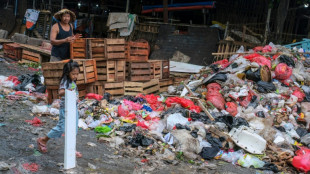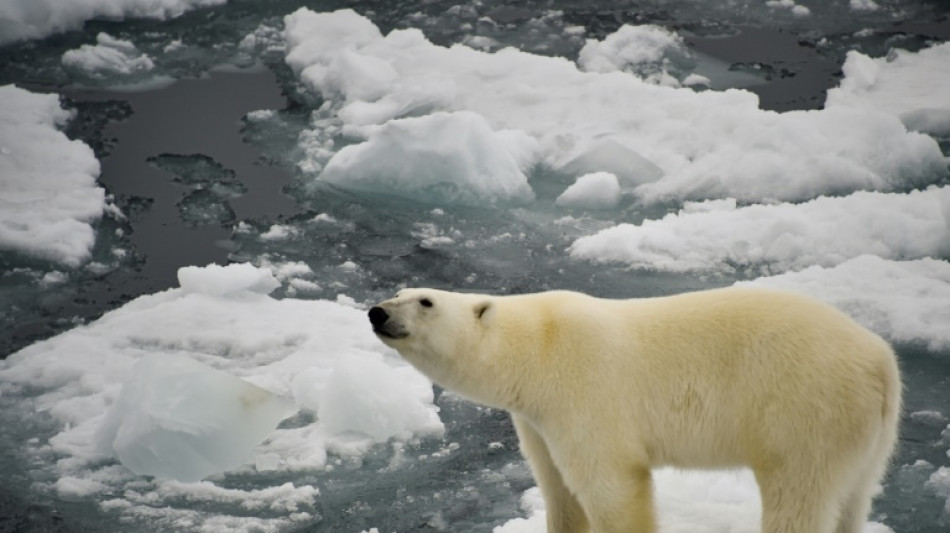
-
 Williams 'on the back foot' after missing Barcelona: Albon
Williams 'on the back foot' after missing Barcelona: Albon
-
Real Madrid submit evidence to UEFA in Vinicius racism probe

-
 Olympics rev up Milan's renewal but locals fear price to pay
Olympics rev up Milan's renewal but locals fear price to pay
-
Cardona Coll, Fatton win Olympic-debuting ski mountaineering sprint golds

-
 MSF will keep operating in Gaza 'as long as we can': mission head
MSF will keep operating in Gaza 'as long as we can': mission head
-
Russian Filippov wins first medal at Milan-Cortina Games for individual neutral athletes

-
 Italian Milan takes sprint honours at UAE Tour
Italian Milan takes sprint honours at UAE Tour
-
Dozens killed in jihadist attacks in northwest Nigeria

-
 Zimbabwe unbeaten in T20 World Cup after six-wicket Sri Lanka win
Zimbabwe unbeaten in T20 World Cup after six-wicket Sri Lanka win
-
Postecoglou admits taking Nottingham Forest post a 'bad decision'

-
 Switzerland's Fatton wins women's ski mountaineering sprint on Olympic debut
Switzerland's Fatton wins women's ski mountaineering sprint on Olympic debut
-
Kinghorn, Van der Merwe return for Scotland against Six Nations strugglers Wales

-
 Repsol says could boost Venezuela oil output over 50% in 12 months
Repsol says could boost Venezuela oil output over 50% in 12 months
-
UN says Israeli actions raise 'ethnic cleansing' fears in West Bank, Gaza

-
 Arteta tells faltering leaders Arsenal to harness Wolves 'pain' against Spurs
Arteta tells faltering leaders Arsenal to harness Wolves 'pain' against Spurs
-
Crowley gets nod for Irish as Prendergast drops out

-
 Unbeaten Swiss to meet Great Britain in Olympic men's curling semis
Unbeaten Swiss to meet Great Britain in Olympic men's curling semis
-
UK police arrest ex-prince Andrew on suspicion of misconduct

-
 Oil extends gains on US-Iran tensions, Europe stocks slide
Oil extends gains on US-Iran tensions, Europe stocks slide
-
Former prince Andrew, a historic downfall

-
 Sri Lanka post 178-7 against Zimbabwe ahead of T20 Super Eights
Sri Lanka post 178-7 against Zimbabwe ahead of T20 Super Eights
-
OpenAI's Altman tells leaders regulation 'urgently' needed
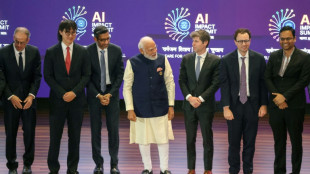
-
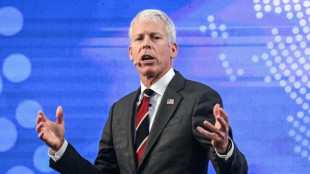 US renews threat to leave IEA
US renews threat to leave IEA
-
Liverpool boss Slot says Isak in 'final stages of rehab'

-
 Airbus ready to build two new European fighter jets if 'customers' ask
Airbus ready to build two new European fighter jets if 'customers' ask
-
UN Sudan probe finds 'hallmarks of genocide' in El-Fasher
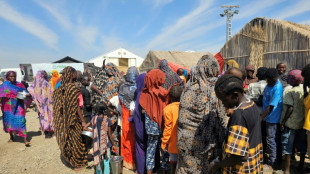
-
 Costelow starts, Hamer-Webb makes Wales debut in Six Nations clash with Scotland
Costelow starts, Hamer-Webb makes Wales debut in Six Nations clash with Scotland
-
Facing US warnings, Iran defends right to nuclear enrichment

-
 Ex-South Korea leader Yoon gets life in prison for insurrection
Ex-South Korea leader Yoon gets life in prison for insurrection
-
OpenAI's Altman says at India summit regulation 'urgently' needed
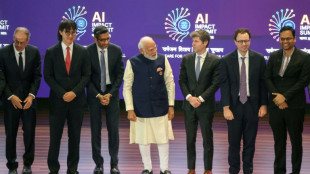
-
 British couple held in Iran sentenced to 10 years
British couple held in Iran sentenced to 10 years
-
West Indies ease past Italy to tune up for T20 Super Eights

-
 At least 16 killed after building collapses in Pakistan following blast
At least 16 killed after building collapses in Pakistan following blast
-
Summit photo op fails to unite AI startup rivals

-
 OpenAI's Altman says world 'urgently' needs AI regulation
OpenAI's Altman says world 'urgently' needs AI regulation
-
Horror comics boom in our age of anxiety

-
 Turkey fires up coal pollution even as it hosts COP31
Turkey fires up coal pollution even as it hosts COP31
-
London fashion week opens with tribute to one of its greats

-
 Ex-S.Korea leader Yoon gets life in prison for insurrection
Ex-S.Korea leader Yoon gets life in prison for insurrection
-
Pea soup, veggie mash contest warms up Dutch winter

-
 South Korea's Yoon: from rising star to jailed ex-president
South Korea's Yoon: from rising star to jailed ex-president
-
Private companies seek to import fuel amid Cuban energy crisis

-
 India search for 'perfect game' as South Africa loom in Super Eights
India search for 'perfect game' as South Africa loom in Super Eights
-
India's Modi calls for inclusive tech at AI summit
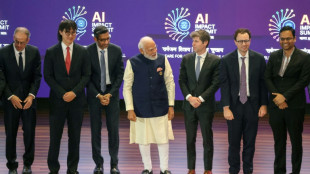
-
 Airbus planning record commercial aircraft deliveries in 2026
Airbus planning record commercial aircraft deliveries in 2026
-
Elections under fire: Colombia endures deadliest campaign in decades

-
 Traore backs 'hungry' Italy against France in Six Nations
Traore backs 'hungry' Italy against France in Six Nations
-
All-rounder Curran brings stuttering England to life at the death

-
 South Korea court weighs death sentence for ex-president Yoon
South Korea court weighs death sentence for ex-president Yoon
-
Tech chiefs address India AI summit as Gates cancels


UN holds biodiversity talks on deal to stave off mass extinction
Global efforts to cut plastic and agricultural pollution, protect a third of wild spaces, and ultimately live "in harmony with nature" will dominate UN biodiversity negotiations starting Monday, held in person after a two-year pandemic delay.
Almost 200 countries are due to adopt a global framework this year to safeguard nature by mid-century from the destruction wrought by humanity, with a key milestone of 30 percent protected by 2030.
The aim is also to safeguard the "services" nature supplies: the air we breathe, the water we drink, the soil that yields the food we eat.
The meeting in Geneva will set the stage for a crucial UN biodiversity summit, initially due to be held in China in 2020 and postponed several times. It is now expected to take place at the end of August.
Geneva is a chance to strengthen a draft global biodiversity agreement "that many observers feel currently lacks the teeth needed to meaningfully address interconnected biodiversity and climate crises that cannot be solved in isolation", according to the Nature Conservancy.
Campaigners have for years called for a deal on halting biodiversity loss similar to what the Paris Agreement outlined for the climate.
Previous efforts to halt this devastation have fallen short, with countries failing, for example, to meet almost all the biodiversity targets set in 2010.
But despite often being overshadowed by the efforts to combat climate change, the plight of the natural world is no less catastrophic.
Intensive agriculture is depleting the soil and fouled waterways, oceans are overfished, plastics and other pollutants are invading ecosystems and threatening our health.
And now climate change is a growing threat that could compound all of these problems.
Last month, the UN's Intergovernmental Panel on Climate Change warned that nine percent of all the world's species will likely be "at high risk" of extinction even if warming is capped at the ambitious Paris target of 1.5 degrees Celsius.
In 2019, a report by UN biodiversity experts said one million species could disappear in the coming decades, raising fears that the world is entering its sixth era of mass extinction in the last half-billion years.
"We only know of about 10 percent of the species that exist on Earth. Some disappear without even having been described, nor ever seen by any human being," Anne Larigauderie, executive secretary of the Intergovernmental Science-Policy Platform on Biodiversity and Ecosystem Services (IPBES), told AFP.
- Ambition -
The United Nations Convention on Biological Diversity (CBD) is aiming to reverse that trend with its global framework.
This round of negotiations began in Rome in February 2020 and was swiftly brought to a halt by the Covid-19 pandemic, though online sessions continued and a draft text was finished in 2021.
It is hoped the in-person meeting in Geneva will move the process closer to a global deal at the UN's COP15 summit in China.
"Will we be able to settle everything? That's the big question," Basile van Havre, one of the two co-chairs of the negotiations, told AFP.
The draft outlines some twenty targets for 2030, including the high-profile ambition to protect at least 30 percent of the Earth's land and water habitats.
It also outlines objectives on reducing the amount of fertilisers and pesticides discharged into the environment and cutting at least $500 billion per year of subsidies harmful to Nature and ecosystems.
But as it stands, Guido Broekhoven of WWF said, the text is "not ambitious and comprehensive enough to address the current biodiversity crisis".
Observers will judge whether the mechanisms put in place -- such as monitoring and enforcement -- correspond to the targets set, said Sebastien Treyer, director general of the IDDRI think tank.
There will also be significant attention on the "mobilisation of financial resources", which are of particular importance to the Global South, he said.
Even the goal of the so-called High Ambition Coalition to protect 30 percent of the planet by 2030 might not be enough, observers said.
"If we do not tackle the indirect causes (of biodiversity loss), in particular production and consumption, there will always be strong erosion," said Juliette Landry, a researcher at IDDRI.
D.Cunningha--AMWN



